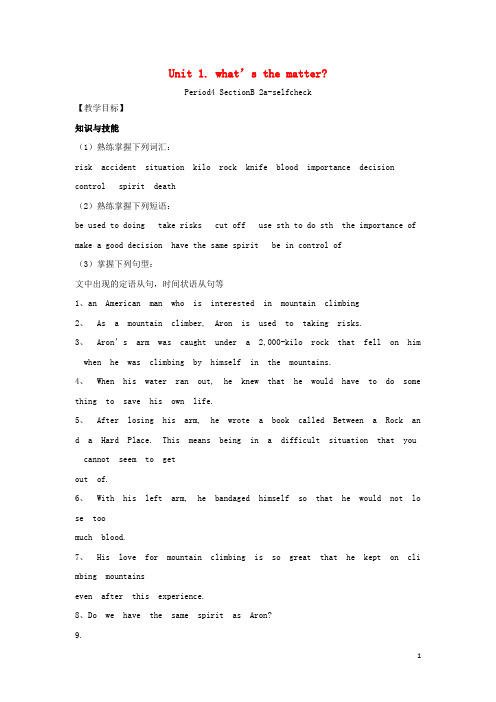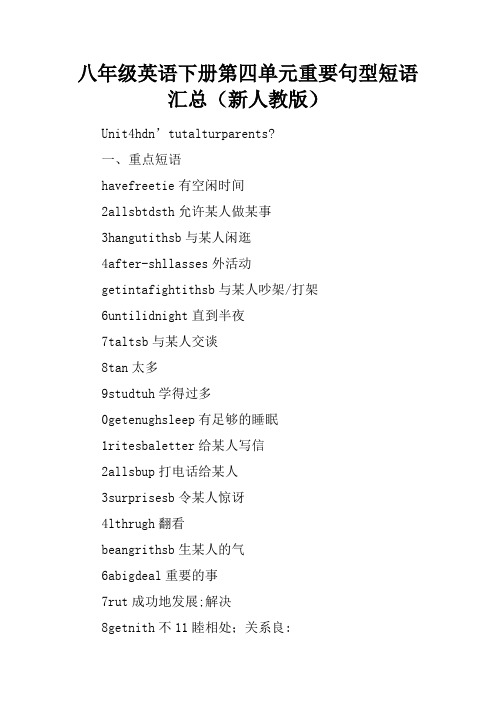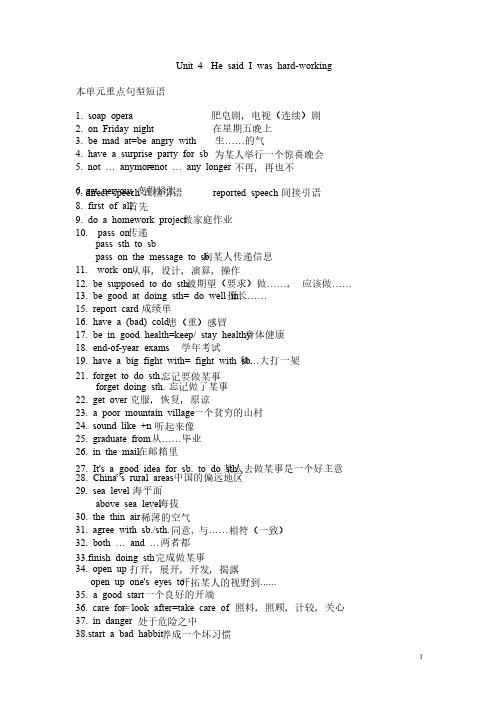2016名师测控人教版八年级英语下册(句型透视)Unit4
【名师测控】2016八年级英语下册 Unit 1 What’s the matter Period 4教学案

Unit 1. what’s the matter?Period4 SectionB 2a-selfcheck【教学目标】知识与技能(1)熟练掌握下列词汇:risk accident situation kilo rock knife blood importance decision control spirit death(2)熟练掌握下列短语:be used to doing take risks cut off use sth to do sth the importance of make a good decision have the same spirit be in control of(3)掌握下列句型:文中出现的定语从句,时间状语从句等1、an American man who is interested in mountain climbing2、As a mountain climber, Aron is used to taking risks.3、Aron’s arm was caught under a 2,000-kilo rock that fell on him when he was climbing by himself in the mountains.4、When his water ran out, he knew that he would have to do some thing to save his own life.5、After losing his arm, he wrote a book called Between a Rock and a Hard Place. This means being in a difficult situation that you cannot seem to getout of.6、With his left arm, he bandaged himself so that he would not lo se toomuch blood.7、His love for mountain climbing is so great that he kept on cli mbing mountainseven after this experience.8、Do we have the same spirit as Aron?9.Let's think about it before we find ourselves “between a rock anda hardplace”, and before we have to make a decision that could mean life or death过程与方法阅读理解,写作练习情感、态度与价值观培养学生敢于面对生活中出现的挫折的精神,拥有坚强的意志力。
2016名师测控人教版八年级英语下册(课件)Unit2 Period4

Review: Sentences
1. 我的妈妈总会让我妹妹兴奋起来。 My mother can often cheer my sister up. 2. 布朗先生是一个优秀的聋人。 Mr. Brown is an excellent deaf man. 3. 非常感谢你对我帮助。 Thanks for your help. 4. 我奶奶对我的生活影响很大。 My grandma makes a big difference in my life. 5. 我们班已经成立了一个图书馆。 Our class has set up a class library. 6. 我们每天都花费两小时做运动。 We spend two hours doing sports every day.
1.Who wrote the letter to Miss Li? Why?
2.What did Miss Li do?
Read in detail. (Paragraph 1) 1.What is “Animal Helpers”?
It is an organization set up to help disabled people. 2. Does Lucky make a big difference in the writer’s life? Yes, he does.
Review: Phrases
1. My bike is broken. Could you help me to____________? fix it up 2. My uncle is repairing some old bikes these them away to charity. days. He plans to give _______________ 3. He has ____________ run out of money and now he has no money for lunch. 4. You are as smart and brave as your father. 5. You ____________ take after him. 6. I can ________________ come up with an idea to solve this math problem.
Unit4单元知识点归纳总结及配套练习人教版英语八年级下册

Unit4 Why don’t you talk to your parent?Ⅰ. Revision(复习)Ⅱ. Presentation(重点,难点,考点,热点呈现)1.Why don’t you do…?【解析】Why don’t you do…?是常见的提建议的句型,该句型还可以用来发出礼貌的邀请。
同样表示征求对方意见的句型:①What about doing…? / How about doing…?②Would you like to do sth…?③Let’s do sth.④You’d better do/ not do sth.【做一做】1. ---Why not ________(wear) a hat? ----Good idea.2. ---How about ___________(visit) our teacher? -----That sounds good.3. ---Let’s __________(take) the dog for a walk. ----Sorry, I can’t.4. Would you mind my __________(open) the door? ----Of course not.5. Would you like ____________(come) to my party? -----I’d love to, but…1. ---Tomorrow will be sunny. How about having a picnic in the park?---_________________ But I have t o prepare for tomorrow’s exam.A. I’d love.B. I’d love to.C. That’s right.2. --- A new 3D movie is on. Shall we go and see it this weekend? --- ____! What’s it?A. I must be going nowB. You are rightC. Why notD. My pleasure3. ---Lo ok! It’s raining heavily. ____ take a raincoat with you? ---Well, I’ll take one right now.A. Why notB. Why don’tC. Would you mindD. Would you like4. A: Would you like to dance with me? B: . I have too much homework.A. Sorry, I can’t.B. Of course not.C. That’s OK.D. I’d like to.2. allow【解析】allow 及物动词,意为“允许”。
2016名师测控人教版八年级英语下册(课件)Unit4Period3

3. compete v. 竞争;对抗
compete with 与……进行竞争 We can’t hope to compete with such a experienced team. 我们没有希望与如此经验丰富的队竞 争。
1c
Listen and check the problems Wei Ming talks about. ___ My parents give me a lot of pressure about school. ___ I don’t get enough sleep. ___ I don’t have enough free time. ___ I had a fight with my parents. ___ I have to compete with my classmates at school.
Difficulties strengthen the mind, as labour does the body. 劳动强体,磨难强智
I left my homework at home.
You should tell it to your teacher. You could call your parents and ask them to bring it to school.
What’s wrong with the girl? She’s too stressed out. What should she do? Can you give her some advice?
1e
What is your advice for Wei Ming? Tell your partner and say why. Why? I think Wei Ming should more free to play sports after class.
2016名师测控人教版八年级英语下册(导学案)Unit7Period4

Unit7 What’s the highest mountain in the world?Period4 SectionB2a-selfcheck【教学目标】知识与技能(1)熟练掌握下列词汇:research,keeper,excitement,illness,remaining,wild,government,protection,huge,bamboo, endangered, awake, artwork,whale, oil,(2)熟练掌握下列短语:with excitement, run over, fall over, walk into, die from illnessjump out of water, protect whales from(3)掌握下列句型:They run over with excitement and some of them even walk into their friends and fall over!Scientists say there are now fewer than 2,000 pandas living in the remaining forests. Another 200 or so live in zoos or research centers in China and other countries. Catch whales for meat, fat and oil.Learn more about whales.Stop putting rubbish into the sea.They have to be protected.过程与方法阅读理解,语法总结与练习情感、态度与价值观通过本课学习,培养学生保护动物的意识。
【教学重难点】重点:1. 学会通过联系上下文猜测生词的词义2. 让学生了解大熊猫的现状及如何保护大熊猫3. 总结形容词和副词的比较级和最高级用法及构词法4. 仿照阅读文章写动物的作文难点:1. 学会用scanning来快速获取需要的信息2.学会通过上下文猜测生词及归纳文段大意3.学会仿写动物的作文【导学过程】一.新课预习1. be awake _____________2. run over with excitement _______________3. walk into sb._____________4. fall over _______________5. take care of ________________6. every two years _________________7. cut down the forests _____________8. endangered animals __________9. fewer and fewer ________________10. be in danger _________________11. the importance of doing sth _______________________二. 情景导入复习上节课所学的有关熊猫基本情况的描述,如身高,体重,饮食等.T:I would like you to talk about pandas as much as you can. The words in the box can help you.调动学生已有的知识储备和激发学生学习的兴趣。
2016名师测控人教版八年级英语下册(课件)Unit4Period4

3. Linda Miller thinks parents should send their small kids to all kinds of classes. F 4. Linda thinks some parents push their kids too much. T 5. Alice thinks kids shouldn’t have time to relax and think for themselves. F
义务教育教科书(人教)八年级英语下册
Section B(2a-selfcheck)
Check the after-school activities you 2a and your classmates usually do.
____ do homework ____ use the Internet ____ have after-school lessons ____ hang out with friends ____ watch movies ____ play sports or exercise
1. Fill in the blanks using until, so that or although.
so that you 1. You should eat more now ______ won’t be hungry later. 2. ________ Although you may not like to do chores, you should help your parents around the house. 3. You could save more money ____ until you can buy a gift for your friend’s birthday.
2016名师测控人教版八年级英语下册(导学案)Unit4Period4

Unit4. why don’t you talk to your parents?Period4 SectionB2a-selfcheck【教学目标】知识与技能(1)熟练掌握下列词汇:pressure compete opinion skill typical football quick continue compare crazy push development cause usual perhaps,although, until(2)熟练掌握下列短语:so that, not…until, cut out, compare A with B, be good for,in my opinion(3)掌握下列句型:归纳征求意见,给出建议的常用句型What should I do? You could … You should…Why not do…? Why don’t you do…?Although…, you should…You could… so that…You shouldn’t do…until…Would you mind doing…?You should do…because…You should learn to relax.过程与方法阅读理解训练,写作练习情感、态度与价值观要学会放松、缓解压力【教学重难点】重点:1) 能运用所学的语言知识来简单地表达自己对某一困难问题的看法和建议。
2)总结本单元所学到的重点词组及句型。
3)复习总结unless, as soon as, so that等词的用法,并能完成相关练习题。
难点:运用所学的语言知识来写一封简短的信,表达自己对学生上课外辅导班这一社会现象的看法。
【导学过程】一.新课预习1.give one’ s opinion 提出某人的观点2.in one’s opinion______________3._______________学习应试技巧4.______________竞争而获胜5._______________一个典型的美国家庭6._______________橄榄球训练7._______________删除;删去8.not…until…_______________9.____________=have dinner quicklypare A with B_______________11._______________孩子的发展12._______________造成许多压力二. 情景导入Review the expressions and sentences.1. 一个典型的美国家庭 a typical American family2. 足球训练football training3. 删除cut out4. 比较;对比compare…with5. 逼得太紧push…so hard6. 一个儿童的成长 a kid’s developme nt7. 疲惫的孩子们直到晚上七点钟后才到家。
2016名师测控人教版八年级英语下册(句型透视)Unit2

2016名师测控人教版八年级英语下册(句型透视)Unit2unit2i’llhelptocleanupthecityparks.你可以帮助打扫城市公园。
【解析1】helpv→helpful2).helponeself(to)自用(食物等)。
3).helpsb.out帮助某人克服困难,渡过难关、解决问题、完成工作。
4).withthehelpof在……帮助下。
5).helpsb.withsth.帮助某人做某事。
【2013日照】15.—maryisso________—sheestoyouwheneveryou’reintrouble.efulb.carefulc.thankfuld.helpful【2012烟台中考】25.thewoman___allofhermoneytocharities____thepoor.a.gaveoff,tohelpb.gaveup,helpingc.gaveaway,tohelpd.gave,helping【解析2】cleanup把……打扫干净(v.+adv.)①it’syourturn____________upthekitchen.(clean)()②yourbedroomistoodirty,please_____.a.cleanitupb.cleanupitc.setitup()③ifeveryonepourslesspollutedwaterintodianchilake,itwillbe___ __.a.deeperanddeeperb.cleanerandcleanerc.dirtieranddirtierd.widerandwider女孩可以去医院看望生病的孩子们,让他们振作起来。
【解析1】sick/ill:也可放n.前作定语。
ill→illnessn.“病;疾病”①②他有一位生病的母亲①ithinkher(ill)isveryserious.我认为她的病是很严重。
2016名师测控人教版八年级英语下册(课件)Unit10Period4

7. Most of the children in my time liked to play together under that big tree , especially during the summer holidays. especially副词,意为“尤其;特别;格 外”,在句中作状语,用于列举某个特 例或某事物的特殊性。形容词 especial“特别的,特殊的”。 e.g. Flowers are always welcomed, especially in winter. 鲜花总是受到欢迎,尤其是冬天。
Think of changes that happening in your town or city today. Which changes are generally good? Whad?
1. Nowadays, millions of Chinese leave the countryside to search for work in the cities. search作不及物动词时,意为“搜索;搜 查”。短语search for意为“搜寻,找 寻”。 e.g. He is searching for his sunglasses. 他正在找他的太阳镜。
4. Many people like Zhong Wei regard with great interest how their hometowns have changed. regard及物动词,意为“将· · · · · · 认为; 把· · · · · · 视为”。常用短语 regard…as…意为“将· · · · · · 视为· · · · · · ; 把· · · · · · 当做······”,as为介词,其后接 名词或代词。
人教版八年级下册英语unit4教案及教学反思

人教版八年级下册英语unit4教案及教学反思全文共3篇示例,供读者参考篇1Unit 4 of the People's Education Press Eighth Grade English textbook is focused on the theme of "Hobbies". This unit aims to help students talk about their own hobbies and interests, as well as learn how to express preferences and opinions.Teaching Objectives:1. Enable students to talk about their hobbies and interests in English.2. Introduce vocabulary related to different hobbies.3. Teach students how to express preferences and opinions.4. Improve students' listening, speaking, reading, and writing skills.Teaching Procedures:1. Warm-up activity: Start the lesson by asking students to share their hobbies with the class. This will help to activate their prior knowledge and create a positive learning atmosphere.2. Vocabulary introduction: Introduce key vocabulary related to hobbies, such as "painting", "cooking", "playing sports", etc. Use pictures, gestures, and realia to help students understand and remember the new words.3. Listening comprehension: Play a listening passage where people talk about their hobbies. Students listen and then answer comprehension questions to check their understanding.4. Speaking practice: Divide the class into pairs or groups and ask them to discuss their own hobbies, using the vocabulary they have learned. Encourage students to ask questions and share their opinions with each other.5. Reading activity: Give students a reading passage about different hobbies and ask them to identify key information, such as the benefits of each hobby and how to get started.6. Writing task: Ask students to write a short paragraph about their favorite hobby, describing why they enjoy it and how it makes them feel. Provide feedback on their writing to help improve their language skills.7. Role-play activity: Divide students into pairs and give them a role-play scenario where they discuss their preferencesfor different hobbies. This will help them practice expressing opinions and using the target vocabulary.8. Review and assessment: End the lesson with a review of key vocabulary and concepts covered in the unit. Administer a quiz or speaking activity to assess students' understanding and progress.Teaching Reflection:Overall, teaching Unit 4 on Hobbies was engaging and effective. The activities helped students practice speaking, listening, reading, and writing skills in a fun and interactive way. However, one area for improvement is to provide more opportunities for students to use the target language in real-life contexts. For example, incorporating project-based learning tasks where students create a hobby-themed presentation or video could further enhance their language proficiency.In conclusion, Unit 4 provided a valuable opportunity for students to explore their interests and hobbies in English. By incorporating a variety of activities and assessments, teachers can help students achieve the learning objectives and improve their English language skills.篇2Unit 4 of the People's Education Edition eighth grade English textbook covers the topic of "Wild Animals". In this unit, students will learn vocabulary related to wild animals, practice reading and listening skills through various texts, and improve their ability to describe animals and discuss their habitats.Lesson 1:- Warm-up: Start the lesson by asking students to name different wild animals they know.- Vocabulary: Introduce new vocabulary words related to wild animals such as lion, elephant, tiger, etc.- Reading: Read a short passage about different wild animals and ask students comprehension questions.- Listening: Play a recording of different animal sounds and ask students to match the sound with the correct animal.- Speaking: Have students describe their favorite wild animal and why they like it.Lesson 2:- Warm-up: Review the vocabulary words from the previous lesson by playing a matching game.- Reading: Read a longer passage about a safari trip and ask students to identify the animals mentioned in the text.- Grammar: Introduce comparatives and superlatives using examples related to wild animals (e.g. The elephant is bigger than the giraffe).- Speaking: Have students work in pairs to discuss which animal they think is the most interesting and why.Lesson 3:- Warm-up: Play a game of charades where students act out different wild animals for their classmates to guess.- Reading: Read a passage about endangered animals and discuss why it is important to protect them.- Writing: Have students write a short paragraph about what they can do to help protect endangered animals.- Speaking: Conduct a class debate on whether or not zoos are good for wild animals.Lesson 4:- Warm-up: Review the vocabulary and grammar concepts learned in the previous lessons through a quiz.- Project: Have students work in groups to create a poster about a specific wild animal, including information about its habitat, diet, and interesting facts.- Presentation: Have each group present their poster to the class and answer questions from their classmates.Teaching Reflection:Overall, the unit was engaging and interactive for students. The variety of activities helped to keep students interested and motivated throughout the lessons. The vocabulary and grammar concepts were presented in a clear and concise manner, allowing students to grasp the new material easily. The project at the end of the unit provided students with an opportunity to apply what they had learned and showcase their creativity. However, I would like to incorporate more opportunities for students to practice speaking and listening skills in future lessons to further develop their language proficiency.篇3Unit 4 of the eighth-grade textbook by People's Education Press focuses on the theme of "Wild animals". In this unit, students will learn about various wild animals and their habitats, as well as the importance of wildlife conservation.The unit is divided into several sections, including reading, listening, speaking, and writing tasks. The reading passages describe different wild animals such as lions, elephants, and pandas, providing students with essential information about these creatures. The listening activities help students improve their listening skills by practicing comprehension and understanding spoken English. Speaking tasks encourage students to express their opinions and share information about wild animals with their peers. Writing tasks require students to write short paragraphs or essays about their favorite kind of wild animal or the importance of wildlife conservation.To begin the unit, teachers can introduce the topic of wild animals by showing pictures or videos of different types of wildlife. This can generate interest and curiosity among students, prompting them to learn more about these fascinating creatures. Teachers can also engage students in group discussions or debates about wildlife conservation and the impact of human activities on the environment.During the reading and listening activities, teachers should provide support and guidance to students as they work through the text and audio materials. Encouraging students to ask questions, make predictions, and summarize key points can helpthem better comprehend the information presented. Teachers can also incorporate vocabulary-building exercises, such as word matching or crossword puzzles, to reinforce new words and concepts.For the speaking and writing tasks, teachers can encourage students to use creative expression and critical thinking skills. Providing opportunities for role-playing, storytelling, and collaborative writing can enhance students' language abilities and boost their confidence in using English. Teachers can also assign group projects or presentations that require students to research and present information about specific wild animals or conservation efforts.In conclusion, Unit 4 of the eighth-grade textbook by People's Education Press offers a comprehensive and engaging exploration of wild animals and wildlife conservation. By incorporating a variety of teaching strategies and activities, teachers can facilitate students' learning and language development in a meaningful and enjoyable way. Through active participation and interaction, students can deepen their understanding of the natural world and cultivate a sense of responsibility towards protecting our environment and its inhabitants.。
2016名师测控人教版八年级英语下册(导学案)Unit4Period1

Unit4. why don’t you talk to your parents?period 1 SectionA1a-2d【教学目标】知识与技能(1)熟练掌握下列词汇:Allow wrong guess although until deal(2)熟练掌握下列短语:too much, too many, look through, give back, so that(3)掌握下列句型:What’s wrong?I’m reall y tried because I studied until midnight last night.You could give him a ticket to a ball game.I think you should ask your parents for some money.Why don’t you talk to him about it?过程与方法讨论,听力训练,pairwork, role-play.情感、态度与价值观遇到问题要主动地去和家人、朋友或亲近的人交流;如果遇到身边的人遇到问题,能主动提供帮助。
【教学重难点】重点:1.掌握4个单词, 1个词组( allow, wrong, guess, deal, work out)2.和朋友伙伴们谈论你的麻烦和问题。
难点:1. Modal verbs could and shouldWhy don’t you ……?2.conjunctions until, so that and although【导学过程】一.新课预习1.get enough sleep2.hang out3.get into a fight4.after-school class5. call up6.it’s not a big deal7.thank you for advice二. 情景导入1. 导入学生们平时在学校和生活中存在的问题。
八年级英语下册第四单元重要句型短语汇总(新人教版)

八年级英语下册第四单元重要句型短语汇总(新人教版)Unit4hdn’tutalturparents?一、重点短语havefreetie有空闲时间2allsbtdsth允许某人做某事3hangutithsb与某人闲逛4after-shllasses外活动getintafightithsb与某人吵架/打架6untilidnight直到半夜7taltsb与某人交谈8tan太多9studtuh学得过多0getenughsleep有足够的睡眠1ritesbaletter给某人写信2allsbup打电话给某人3surprisesb令某人惊讶4lthrugh翻看beangrithsb生某人的气6abigdeal重要的事7rut成功地发展;解决8getnith不11睦相处;关系良:9fightalt经常吵架/打架20hangver笼罩21refusetdsth拒绝做某事22ffertdsth主动提出做某事23sthat以便24indsbdingsth介意某人做某事2allthetie一直26infuture今后27aesbangr使某人生气28rrabutsth担心某事29pne’sher抄袭某人的作业30beneself做自己31failebers32spendtiealne独自消磨时光33givesbpressure给某人施压34haveafightithsb与某人吵架3peteithsb与某人竞争36freetieativities业余活动37getbettergrades取得更好的成绩38givene’spinin提出某人的观点39learnexasills学习应试技巧40pratiesprts体育训练41ausestress造成压力42utut删除二、重点句型IstudieduntilidnightlastnightsIdidn‘tget enughsleep我昨晚学习到半夜所以睡眠不足。
2hdn'tufrgetabutit?你为什么不忘掉它呢?3Althughshe’srng,it'sntabigdeal虽然她错了•但这并不是什么大事儿。
2016名师测控人教版八年级英语下册

The Himalayas _______ runs along the ____________ southwestern border of china. Of all the peaks (tops), Qomolangma is the famous It’s _________ highest and most _________. _____________ the hardest to climb Qomolangma cover the top of because thick clouds _______ the mountain. Even more serious difficulties include the freezing ___________ ___________ weather conditions and the _______ heavy storms.
10. force n. 力;力量 e.g. The thief took the money from the old man by force. 窃贼用暴力抢了老人的钱。
What do you know about Qomolangma?
Talk about Qomolangma in pairs.
Qomolangma Mount Huang
8,848 1,864
Mount Tai
1,545
Mount Tai is high. Mount Huang is a little _______ higher than Mount Tai. Qomolangma is ____________ the highest of all. Mount Tai is not ___ as high ___ as Qomolangma. = Mount Tai is not _______ higher than Qomolangma.
2016名师测控人教版八年级英语下册课件 (3)

What happened next?
How did the day end?
How did you feel about this day?
3b Write a story about your lucky or unlucky day and tell your story to a partner or the class.
• • •
• • • •
My lucky/unlucky day I will always remember the date… . This was the luckiest/unluckiest day of my life. When I woke up that morning,… Later that day, I couldn’t believe Then/After that, Finally, I think What a lucky/an unlucky day!
Check
market west officers above course pie blocking
lady
discovery
The world is like a mirror: Frown at it and it frowns at you; smile, and it smiles too. 世界犹 如一面镜子:朝它皱眉它就朝你皱眉,朝它微 笑它也朝你微笑。
He told the news in October rather than April in 1938.
5. Why did so many people believe Orson Welles?
Because he made it sound so real.
人教版八年级下unit4重点知识,语法讲解

Unit 4 He said I was hard-working 本单元重点句型短语本单元重点句型短语1. soap opera 肥皂剧,电视(连续)剧2. on Friday night 在星期五晚上在星期五晚上3. be mad at=be angry with 生……的气的气4. have a surprise party for sb 为某人举行一个惊喜晚会5. not … anymore =not … any longer 不再,再也不不再,再也不6. get nervous 变得紧张变得紧张7. direct speech 直接引语直接引语 reported speech 间接引语间接引语8. first of all 首先首先9. do a homework project 做家庭作业做家庭作业10. pass on 传递传递pass sth to sb pass on the message to sb 向某人传递信息向某人传递信息11. work on 从事,设计,演算,操作12. be supposed to do sth. 被期望(要求)做……, 应该做……13. be good at doing sth= do well in 擅长……15. report card 成绩单成绩单16. have a (bad) cold 患(重)感冒患(重)感冒17. be in good health=keep/ stay healthy 身体健康身体健康18. end-of-year exams 学年考试学年考试19. have a big fight with= fight with sb. 和…大打一架大打一架21. forget to do sth. 忘记要做某事忘记要做某事 forget doing sth. 忘记做了某事忘记做了某事22. get over 克服,恢复,原谅克服,恢复,原谅23. a poor mountain village 一个贫穷的山村一个贫穷的山村24. sound like +n 听起来像听起来像25. graduate from 从……毕业毕业26. in the mail 在邮箱里在邮箱里27. It's a good idea for sb. to do sth. 某人去做某事是一个好主意28. China‟s rural areas 中国的偏远地区中国的偏远地区 29. sea level 海平面海平面above sea level 海拔海拔海拔30. the thin air 稀薄的空气稀薄的空气31. agree with sb./sth. 同意, 与……相符(一致)相符(一致)32. both … and … 两者都两者都33.finish doing sth 完成做某事完成做某事完成做某事 34. open up 打开,展开,开发,揭露open up one's eyes to 开拓某人的视野到...... 35. a good start 一个良好的开端一个良好的开端36. care for =look after=take care of 照料,照顾,计较,关心37. in danger 处于危险之中处于危险之中38.start a bad habbit 养成一个坏习惯养成一个坏习惯39.copy one ‟s homework 抄袭某人的做业抄袭某人的做业40.send one ‟s love 问好问好41.find science really difficult 发现科学真的很难发现科学真的很难 42.make a decision to do sth.=decide to do sth. 决定做某事决定做某事43.decide to do sth 决定做某事决定做某事决定做某事 44.there is no difference between ...and... 在...和...之间没有区别之间没有区别45.it's just that... 只不过,只是只不过,只是46.be over 结束,完成结束,完成47.in the city of 市48.a one-year program 一个一年期的项目一个一年期的项目49.people who need help 需要帮助的人需要帮助的人50.something we can do for them 我们能为他们做我们能为他们做本单元目标句型:本单元目标句型:转述他人话语:What did sb. say? He said I …She said she…They said…1. 许老师告诉我徐梦蝶会说二种语言。
人教版本英语初中八年级的下unit4讲解及练习.doc

Unit 4 Why don’t you talk to your parents1. I have to study too much so I don’t get enough sleep.1)此处 so 为连词,意为“因此,所以”,引导结果状语从句。
例: He had a bad cold yesterday so he didn’t go to school.中考链接(2012. 广东) Ben was busy taking a training class, _____ we had to wait for him for half an hour.A. soB. ifC. orD. But2)此处 sleep 为不可数名词,意为“睡觉,睡眠”例: Do you ever talk in your sleep【拓展】 sleep (slept, slept)也可作不及物动词,意为“睡觉”例: She goes to sleep at nine o’clock every night.2. I have too much homework so I don ’t have any free time to do things I like.1)词语辨析Too much:词义____________可修饰_______________举例_______________________________________________Much too:词义____________可修饰_______________举例_______________________________________________Too many:词义____________可修饰_______________举例_______________________________________________2) 此处 to do things为动词不定式作后置定语,修饰名词time.例: Would you like something ___________你想要吃点什么吗3.My parents don ’t allow me to hang out with my friends.1)此处 allow 作及物动词,意为“允许”Allow sb. to do sth.允许某人做某事例句: I can ’t allow you to talk to Mom like that.【拓展】 a. Allow sth. 允许某事b. Allow doing sth. 允许做某事2 )此处hang out (hung out) 意为“闲逛,溜达”例: He often hangs out with his friends.4. I ’m really tired because I studied until midnight las t night.此处 until为介词,意为“直到...... 为止”,同义词为till.It may last until tomorrow.【拓展】 until为连词,意为“直到......为止”,引导时间状语从句。
名师测控(安徽专版)人教版八年级英语下册(导学案)Unit 4 1

Unit4. why don’t you talk to your parents?period 1 SectionA1a-2d【教学目标】知识与技能(1)熟练掌握下列词汇:Allow wrong guess although until deal(2)熟练掌握下列短语:too much, too many, look through, give back, so that(3)掌握下列句型:What’s wrong?I’m reall y tried because I studied until midnight last night.You could give him a ticket to a ball game.I think you should ask your parents for some money.Why don’t you talk to him about it?过程与方法讨论,听力训练,pairwork, role-play.情感、态度与价值观遇到问题要主动地去和家人、朋友或亲近的人交流;如果遇到身边的人遇到问题,能主动提供帮助。
【教学重难点】重点:1.掌握4个单词, 1个词组( allow, wrong, guess, deal, work out)2.和朋友伙伴们谈论你的麻烦和问题。
难点:1. Modal verbs could and shouldWhy don’t you ……?2.conjunctions until, so that and although【导学过程】一.新课预习1.get enough sleep2.hang out3.get into a fight4.after-school class5. call up6.it’s not a big deal7.thank you for advice二. 情景导入1. 导入学生们平时在学校和生活中存在的问题。
- 1、下载文档前请自行甄别文档内容的完整性,平台不提供额外的编辑、内容补充、找答案等附加服务。
- 2、"仅部分预览"的文档,不可在线预览部分如存在完整性等问题,可反馈申请退款(可完整预览的文档不适用该条件!)。
- 3、如文档侵犯您的权益,请联系客服反馈,我们会尽快为您处理(人工客服工作时间:9:00-18:30)。
句型透视
Unit 4 Why don’t you talk to your parents?
Section A
1. Why don’t you get her a scarf? 为什么不给她买条围巾呢?
(1) Why don’t you do sth.? = Why not do sth.? 意为“为什么不做某事呢?”,常用来提出建议,表示商量。
如:
Why don’t you go to the movies? = Why not go to the movies? 为什么你不去看电影呢?
(2) get sb. sth.在此意为“送给某人某物”。
如:
I got my brother a basketball. 我送给我弟弟一个篮球。
2. How about a scarf? 买条围巾怎么样?
在这里,how about = what about 意为“……怎么样?”,用于征求他人意见和建议,其后常接名词、代词或V-ing形式。
如:
What / How about this book? 这本书怎么样?
What / How about going swimming? 去游泳怎么样?
3. Is it someone in your family? 是你家里有人要过生日吗?
人称代词it一般指无生命或有生命的事物,有时也可用来指人。
如果所谈到的那个人在说话人心目中还弄不清楚,就要用it。
如:
There is somebody moving upstairs. Who is it? 楼上有人走动。
是谁呢?
此外,it还可以指代baby。
如:
The baby was ill. Its mother took good care of it. 婴儿病了,母亲悉心护理他。
Section B
4. Dogs are too difficult to take care of. 狗太难照顾了。
(1) too ... to ... 意为“太……而不能……”,表示否定意义,too后接形容词或副词的原级,to 后接动词原形。
如:
The box is too heavy for me to carry. 这个箱子太重,我搬不动。
(2) take care of 意为“照顾;照料”,相当于look after。
如:
I took care of / looked after my grandfather yesterday. 昨天我照顾我爷爷了。
5. Sometimes I don’t have enough time to spend with her. 有时我没有足够的时间同
她呆在一起。
(1) sometimes 为副词,意为“有时”,在句子中位置灵活。
如:
Sometimes he goes to school on foot. 有时他步行去上学。
Mr Wang sometimes has lunch at school. 王老师有时在学校吃午饭。
(2) spend意为“花费”,可以指花费时间或金钱,主语通常为人,其常用结构为:spend ... on sth.; spend ... (in) doing sth.。
如:
She spends lots of money on clothes every year. 她每年花很多钱买衣服。
The workers spent much time(in) building the building. 工人们建这幢楼花费了很多时间。
6. In the USA, some people ask their families and friends to give money to charity rather than buy them gifts. 在美国,一些人让他们的家人和朋友选择捐款给慈善机构而不是给他们买礼物。
rather than 意为“与其……不如;而不是”,通常用来连接两个并列结构,包括名词、代词、动词、介词短语甚至句子。
如:
She is a doctor rather than a teacher. 与其说她是一位教师,不如说她是一名医生。
The little girl smiled rather than cried. 这个小女孩笑了,而不是哭了。
